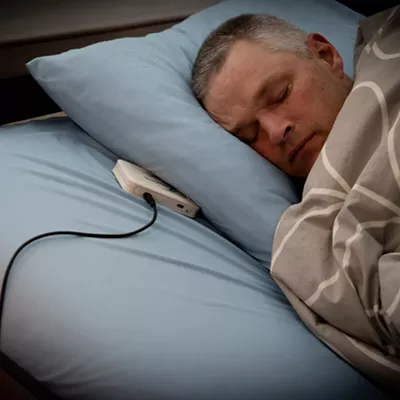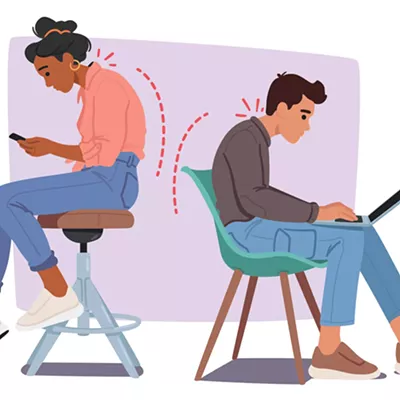Let's face it, America isn't exactly known for celebrating vacation time — about a quarter of workers don't get any paid time off at all because the United States doesn't require any. And more than half of people who did get paid vacation didn't use at least some of the time they were owed last year.
The reasons for not taking time off vary: some workers worry about looking lazy, some worry about the costs of travel, and others find it hard to disconnect from work even when they do take time off.
But here's the thing: Studies increasingly show we need vacations, and employers actually benefit from their employees getting a break. Vacations reduce stress, increase productivity and prevent burnout.
"Taking time off is associated with being happier in relationships, in health and wellbeing, and at the company in one's specific job," says associate professor Julie Son, who oversees the Recreation, Sport and Tourism Management program at the University of Idaho.
Not only does travel help prevent burnout, but it also reduces feelings of alienation, when people can get too immersed in their work and lose their sense of purpose in life, Son says.
"If you don't have a sense of meaning, that can affect your work productivity," she says. "Travel can help you cope with the stress of burnout and get a sense of self and meaning."
There's that strong Protestant work ethic ingrained in American culture, with some workers even battling unwritten workplace expectations that they don't take time off, but in the long run, it's important to take breaks, Son says.
"We feel the harder we work, the better," Son says. "But what we fail to realize is balance is very important. If we work too hard, there are going to be ramifications in terms of one's health."
HOW MUCH TIME IS GOOD TIME?
The good news is, you don't have to take a three-week tour of Europe (even though that'd be awesome) to enjoy the benefits of a vacation, including better health and wellness. Most health and wellness improvements peaked by the 8th day of vacation, according to a study of the effects of long vacations averaging 23 days that was published in the Journal of Happiness Studies in 2013, by researchers Jessica de Bloom, Sabine Geurts and Michiel Kompier. Vacations led subjects to report less fatigue and tension and increased energy level and "satisfaction with the day."
Another study by the three researchers found that positive health and wellness impacts — so-called "recovery" from the stresses of work — can be felt in vacations as short as four to five days.
"For the recovery experience, a short vacation seems to have as much of a benefit as a long vacation," says professor Todd Thorsteinson, department chair for psychology and communication studies at U of I. "Why we think that is [because] the longer you're away, the more things at work probably build up. So if you take a super long vacation and then you get back on Monday, you're just swamped."
However, it turns out, the benefits of vacation tend to wear off pretty quickly after we return to work: Within a week to three weeks, people reported going back to the same stress levels they were at before their vacations, according to multiple studies where vacationers reported their feelings before, during and after vacation.
Strategically then, it might make sense to take shorter trips more frequently to get benefits more regularly.
BENEFIT BY PLANNING
While those positive effects of vacation tend to drop off quickly after we return to work, you should plan — and plan early — for time off, because the benefits can actually start during the buildup to your trip as you get excited for the vacation.
A 2010 study published in Applied Research in Quality of Life found that the more than 1,500 Dutch people surveyed were actually happier than coworkers before taking their vacation, but not after, and researchers thought that might be because the anticipation of traveling lifted their moods.
"It helps us to say, 'Oh I'm having these work stressors, but that's okay, I've got a vacation coming up and I'll get a break from these stressors or long hours,'" Son says.
It also turns out people who plan their vacations ahead of time are more likely to use all the vacation days they earn, while those who don't plan are more likely to lose them, according to Project: Time Off, an initiative by the U.S. Travel Association to provide evidence-based research on the benefits of vacation.
"If you don't plan, research indicates you don't end up doing it," Son says. "Planning ahead seems to be an important aspect of actually making it to vacation."
So go ahead and break out those calendars, but just remember not to sweat the small stuff — some research has shown that too much planning stress can counteract the good vibes you get during your time off.
NEAR OR FAR
To really benefit, what's the best type of vacation? Sitting on the beach? Adventuring through the mountains? Camping? Visiting a new city you've never been to?
"All travel and touristic experiences from the traveler's standpoint are beneficial," Son says. "Anything that connects us back to each other or connects us to new experiences has value."
And it's totally fine if you can't take a vacation far from home, she says, because there are ways to benefit from familiar locations with your family.
Some research has shown that familiar or "core" activities, like going outside for a walk or playing catch, can help kids feel closer to their parents, Son says, while new or "balance" experiences can help with bonding.
"For instance that could be going whitewater rafting at Riggins, or going up to Priest Lake. We might not be able to do those all the time, but maybe can do them a few times a year," Son says. "They allow for bonding in a new environment in the family unit."
And because research shows benefits of both, you shouldn't feel bad if your income limits you from going on a larger vacation, she says.
Recently, Son and her family traveled to Sandpoint for two days, where they ate at restaurants, played frisbee golf, went to the beach and enjoyed Cinco de Mayo celebrations.
"My (6-year-old) daughter could not stop talking about going up to Sandpoint," Son says. "I swear it's helped her mood all week."
Some ways to capitalize while on a budget might be to look for one big new thing to do while on a more affordable trip. For example, visiting Farragut State Park on Lake Pend Oreille will run you the cost of camping or a day pass for park access, Son says, but maybe you could also swing for passes to the new ropes course opening there this summer.
And if you really can't get far away, and need to take a "staycation," it turns out that the community benefits are huge when people choose to stay close to home, Son says.
"Health and wellbeing is promoted by vacationing, but also community economics," she says. "The thing that's so great is by virtue of staying more local, people are providing an immense economic boon to their state."
NEW LINGO
The Great Recession brought us the term "staycation" to describe the close-to-home time off that many Americans started taking as their finances tightened.
A decade later, we have the term "workcation" to refer to a trip where one of the growing number of people who can work remotely chooses to travel to a new destination and work while they're there.
"For some employees, it is an option that allows them to enjoy a destination without having it count against their vacation time," states the Project: Time Off report The State of American Vacation 2018. "For others, though, it may be further evidence of work martyrdom."
COSTS A CONCERN
Most people say cost is a barrier to taking time off for travel, but interestingly it doesn't seem to matter how much people earn for that to be the case: 71 percent of all respondents to a survey by Project: Time Off said that costs were a challenge when thinking about travel, while that was still true for 68 percent of those who earn more than $100,000 a year. ♦
IN NEED OF IDEAS?
ADRENALINE PUMPING
A little like visiting Europe without leaving Washington, Leavenworth offers plenty of outdoor adventures. Consider rock climbing the area's prized high-quality granite; choose among many climbs with varying degrees of difficulty. Or seek your thrills on the water. Outfitters offer kayak, raft or float trips on the Icicle and Wenatchee rivers with rapids ranging from Class II (fun floats that whole families can enjoy) all the way to Class IV Tinley Falls and Triple Shot rapids best left to the experts. When you're ready to settle down, enjoy browsing the alpine hamlet's shops and enjoy a meal at one of the many restaurants.
LEARNING THROUGH EXPERIENCE
Reading about history fails to compete with actually experiencing it. Pick up a wealth of facts about the region's history with a trip to Idaho's Silver Valley. Take a tour of a silver mine to gain a new understanding of the the back-breaking labor, and spooky environment, early miners experienced. Then head to the Pulaski Tunnel Trail to explore just one small part of 1910's largest forest fire in American history. Read all about the incredible fire and the origins of the Forest Service in Tim Egan's The Big Burn: Teddy Roosevelt and the Fire that Saved America. Other worthy destinations for the history buff are Fort Steele Heritage Town in British Columbia and the Grant-Kohrs Ranch in Deer Lodge, Montana. Both feature actors going about life in frontier settings.
ARTISTICALLY INCLINED
As the Schweitzer Mountain chairlift whisks you, feet dangling, to the top of the mountain in five minutes, try not to look down. Once safely on the ground, it's hard not to be inspired to shoot photos in every direction. Enjoy exploring around the summit, pop in for lunch at the Sky House, and then hike the nature trail back down. (You can also ride the Great Escape Quad back down.) Back in equally picturesque Sandpoint, stop in some of the galleries lining charming First Street; Art Works gallery features the work of more than 50 regional artists. The summer chairlift season kicks off with unlimited free rides on opening day, June 24.






















